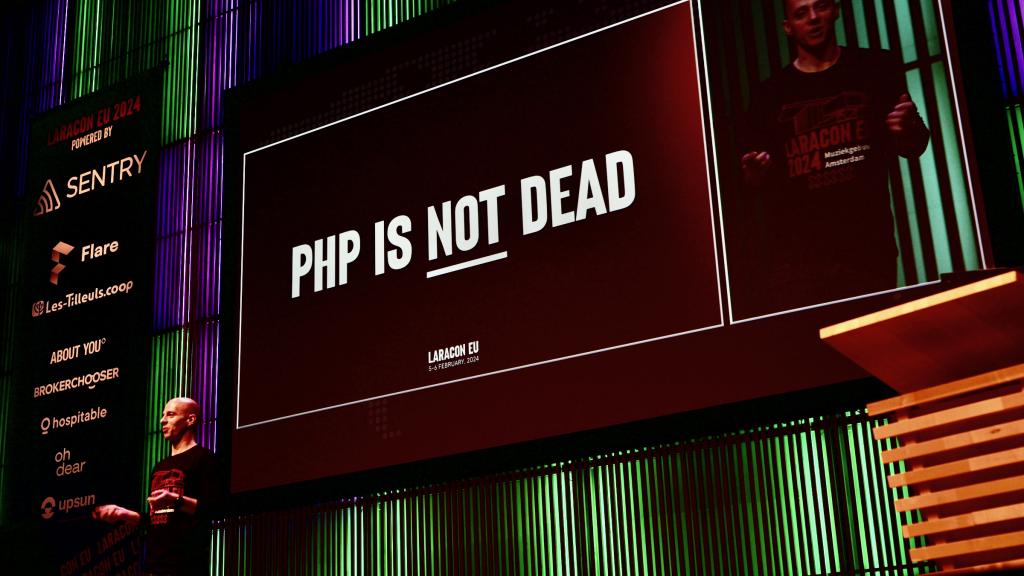PHP is dead. Long live PHP.


PHP, the language that has supposedly been dead for years, is still alive. It is like a zombie that simply refuses to quit.
For years we have been hearing the same refrain: "PHP is outdated and slow. You should use this new, modern language that will revolutionize the web." JavaScript, for example. Or even better: Rust. Because it is supposedly umpteen times faster.
PHP has been optimized over the years to such an extent that even a notoriously heavy system like WordPress can be run at perfectly acceptable speeds.
PHP is still alive -- and thriving
Let us look at reality. The majority of websites on the internet run on PHP and MySQL. How can we make that claim? Around 43% of all websites use WordPress. Whether WordPress itself deserves criticism is a separate discussion -- but you could actually turn the statistic into an argument in favor of PHP: the runtime has been optimized so aggressively over the years that even a heavy system like WordPress runs fast enough for production.
Why is PHP so widely used?
Not just because WordPress is hard to get rid of, but because PHP works. It may not be the coolest kid on the block, but it gets the job done -- and it does it very well. PHP has evolved enormously over the years into a robust, mature language. Anyone comfortable with object-oriented programming can write well-scaling web applications with it.
PHP frameworks like Laravel
Let us talk about Laravel. It is not only comprehensive but also mature. After installing Laravel and a starter kit you get a web application that already ships with all the foundational features virtually every project needs:
Login and registration
Password change and recovery
Two-factor authentication
Team management
Plus numerous utilities that are essential for ongoing development.
Which JavaScript or Rust framework offers all of this out of the box? None. In the JavaScript world you could cobble together the features listed above by combining dozens of packages. But the time and effort required is completely disproportionate to the speed and quality with which you can bootstrap a project using Laravel.
Typically, a new JavaScript framework is hyped because it is "so much faster." Faster at what, exactly? Hot reloading? Great. And what does that buy me? While I am busy reinventing the wheel to implement basic authentication and team management, at least the reload times are shorter. Thanks for that.
With Laravel and PHP we skip the boilerplate and go straight to solving our customers' problems. That is where the real value is created -- not in fast hot reloading or 2% more requests per second.
Microservices are not a silver bullet
The hype around new technologies is always tempting. Microservices, containerization, and serverless architectures remain hot topics. But let us not be blinded by the hype. Yes, for certain large enterprises and genuinely complex systems, microservices can make sense. For small teams and projects, however, a monolithic approach is far more practical.
Microservices may offer theoretical benefits, but in practice they bring considerable overhead -- and overhead means cost. Developing and maintaining microservices demands more effort, more specialized staff (in an era of talent shortages), and a solid infrastructure to run effectively. For smaller teams this can become a massive burden that hurts both progress and productivity.
If you are not Netflix, you can very comfortably do without microservices. Even Amazon moved back to a monolithic architecture and cut 90% of its costs.
Laravel and high availability
Until 2021, Lumen existed as a micro-framework designed to deliver extra speed for performance-critical use cases. That is no longer necessary. Lumen has been discontinued. With PHP OPCache, solutions like Octane, or Vapor for scalable hosting on AWS, virtually any workload can be handled by PHP.
Doubts?
But who am I to say all this? The founder of an agency that specializes in Laravel and PHP? Of course I hold this opinion.
You know who else shares it? Fullstack developer Adam Elmore. In his entertaining YouTube video he tries Laravel for the first time and is visibly impressed.
Laravel and PHP are used by enterprise companies
OpenAI, currently the leading company in artificial intelligence, chose Twill to manage their website. Twill is a CMS built specifically for Laravel. This choice underscores the power of Laravel and PHP as a foundation for mission-critical systems.

Shopify, one of the largest and most popular e-commerce platforms, uses Laravel as the recommended template for building Shopify apps.

Long live PHP!